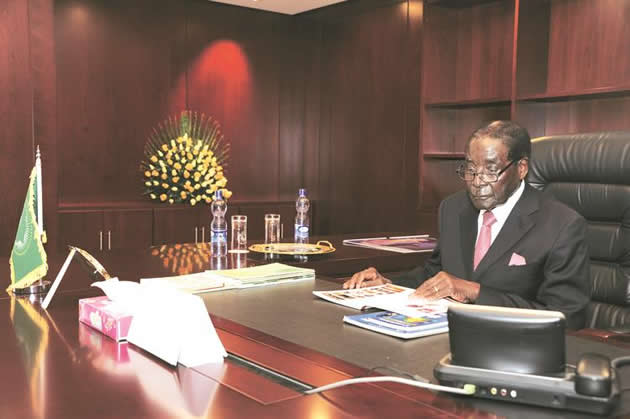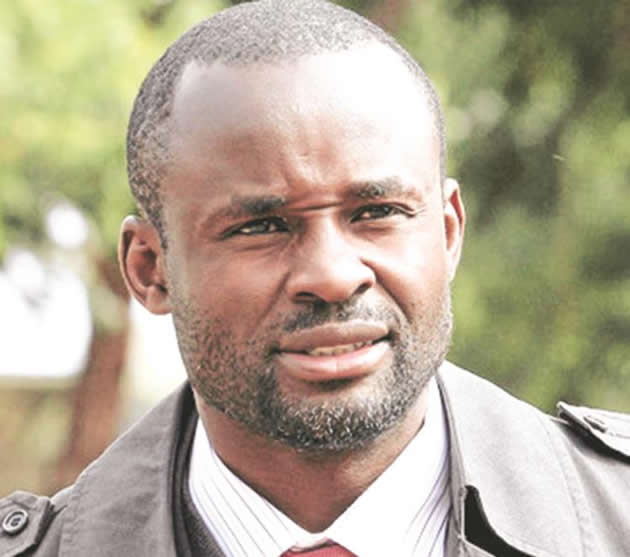EU in sanctions dilemma


President Mugabe gets down to business in his immaculate office at the African Union Headquarters in Addis Ababa, Ethiopia, yesterday. — (Picture by Presidential photographer Joseph Nyadzayo)
From Caesar Zvayi in ADDIS ABABA, Ethiopia
PRESIDENT Mugabe’s assumption of the African Union chairmanship, which came against spirited Western opposition, apparently left the European Union between a rock and a hard place as it did not know how to deal with a man it loathes, but who is adored not only by his country, but by the sub-region and continent as a whole.
The Westerners had tried to scupper President Mugabe’s ascension from first vice chairman of the AU to chairman, saying the continental body should not entertain being led by a man and country under sanctions.
And yesterday the first such signs of dilemma were manifest in the announcement by the EU that they were easing the travel ban on President Mugabe for the duration of his tenure as AU chairman.
The Associated Press yesterday quoted EU spokesperson Catherine Ray saying the European bloc was easing the travel ban on President Mugabe.
“The European Union is easing its travel ban on Zimbabwe’s President, Robert Mugabe, while he serves as chairman of the African Union for the next year, the ban will be lifted when he is traveling under his African Union chairmanship capacity,” Ms Ray said.
The EU imposed illegal economic sanctions on Zimbabwe in February 2002 in the wake of the expulsion of the head of the EU Observer Mission to the 2002 presidential election, one Pierre Schorri, who had violated his visa conditions.
The bloc used that incident to buy into British attempts to internationalise their bilateral dispute with Zimbabwe in the wake of the Government’s decision to embark on the fast-track land reform programme.
The fast track land reform programme having been necessitated firstly by Britain’s flagrant violation of the international law of succession that bid the New Labour government of the then premier Tony Blair to honour obligations entered into by the Tory administration of Margaret Thatcher at the Lancaster House Constitutional Conference in 1979, but instead the then British secretary for international development Claire Short wrote to the Government of Zimbabwe, on November 5 1997, saying Britain had no obligation to fund the costs of land purchase in Zimbabwe.
This shirking of responsibility was followed by the failure of the Land Donor Conference of 1998 that left Government with no option but to announce they were acquiring white-held farms without compensation.
The travel ban component of the illegal EU sanctions; that were imposed in violation of the Cotonou Agreement that governs relations between African, Caribbean and Pacific countries, has been gradually eased over the years leaving President Mugabe and the First Lady on the travel ban list.
Though efforts to get comment from Presidential spokesman Mr George Charamba and Foreign Affairs Minister Simbarashe Mumbengegwi were unsuccessful last night, several readings can be made from the EU announcement.
Firstly the announcement of the relaxation of sanctions, that comes just two weeks before the scheduled annual review on February 18 and just five days after President Mugabe’s assumption of the AU chairmanship clearly show the link between the chairmanship of the continental body and Zimbabwe’s national fortunes.
President Mugabe’s assumption of the continental chairmanship, in light of the EU’s illegal sanctions regime, left the European bloc with very hard choices given that the AU has long condemned the sanctions.
The EU thus had to choose between British-led sanctions, with the attendant threat of antagonising Africa with whom they seek synergies through the EU-Africa Forum, or relaxing the sanctions further as a way out of an unpopular measure which they were forced into by the constraints of group solidarity, with the attendant problem of weakening EU solidarity on the same.
Clearly the EU chose the latter option, which helps them minimise the losses already suffered.
And President Mugabe, on Saturday made it clear that he was unfazed by what the west thought about his chairmanship.
Fielding questions during a press conference that followed the official closing of the 24th Ordinary Summit of the African Union General Assembly on Saturday; and in response to a question on whether Zimbabwe’s frosty relations with the West would not impact on his continental duties, the President said that was for the West to worry about.
‘‘I don’t know what the West will say or do, that is not my business. My business is to ensure that the decisions that we have arrived at here are implemented and they are all decisions which have to do with the development of Africa; that is my concern, concentrating on bettering the lives of the people, giving them something that will raise their standard of living. This can only come from us working together, taking advantage of the resources we have in Africa and ensuring that we add value to them, beneficiate them and the earnings there from go into the development of Africa,’’ he said.
The EU announcement, in the case of Zimbabwe, is a case of one victory triggering another in related foreign affairs breakthrough.
The EU climbdown exposes those who have been trying to belittle the significance of Zimbabwe’s triumph against over 15 years of Western propaganda by claiming that the AU chairmanship was ceremonial.
The EU would certainly not have announced such a major policy shift where a titular development is concerned.
The EU climbdown can also be read as an indication of the weakening of the British hold within the bloc, with countries like Belgium and France having seized the initiative to weaken the British case even further by engaging Zimbabwe in the case of Brussels over the issue of the sell of Zimbabwe’s diamonds on the international market, and in the case of France dispatching a business delegation to explore investment opportunities.
The British would have wanted to keep the sanctions as was, in deference to the May, British general elections, so as to keep the matter outside domestic politics of their country. They have now been clearly outstaged as the European bloc has, for instance, restored European Development Fund which had been removed as part of EU sanctions, with almost US$300 million being made available to Zimbabwe beginning this month.
The message that was also sent by the African Union through the adoption of Agenda 2063 that to harness Africa’s resources for the benefit of Africans seems also to have told the westerners that the objective of the sanctions; that of quashing Zimbabwe’s pro-people policies or confining them to Zimbabwe and aborted as their was now a shared vision of resource nationalism across the continent.
Zim-Asset, Zimbabwe’s economic blueprint for the period 2013 to 2018, and Agenda 2063 — the AU 50-year development roadmap have striking similarities as both seek to harness domestic resources for the betterment of the lives of Africans by promoting value-addition, beneficiation and the development of infrastructure and utilities to facilitate industrialisation.
This means Zimbabwe’s national agenda has gone continental, and Europe realises that it is better to engage Zimbabwe, through Africa, than inflame this rhetoric indirectly through barring Africa’s chairman. After all, barring President Mugabe from any representative interactions would have drawn out the continent, thereby making Zimbabwe’s sanctions issue truly continental.
This would have meant that the issue of the AU chairmanship can only be nominated or recommended by Africa, with EU ratifying it.
President Mugabe had long put the AU on the back-foot by boycotting last April’s EU-Africa Summit in Brussels, Belgium after the European bloc tried to decide the composition of the presidential delegation after denying First Lady Amai Grace Mugabe a visa.
President Mugabe’s assumption of the chairmanship also coincided with the AU’s disquiet over the current funding scenario that sees over 72 percent of the AU budget coming from donors with member states meeting the remaining 28 percent.
President Mugabe, for long a proponent of financial autonomy, has since steered the AU to resolve to look for alternative sources of funding to enable the AU to fund 100 percent of its running costs, at least 75 percent of its programme expenses, and at least 25 percent of peacekeeping operations within the next five years, and to cumulatively build on this till it is able to fund its entire budget.
This, and the adoption of Agenda 2063, are the first clear indicators that the AU is set for a new course under President Mugabe’s leadership as was indeed highlighted by the president of the AU Staff Association Mr Salah Siddiq Hammad, who said AU staffers were confident President Mugabe would help foster the Union’s financial independence the same way he has fought for holistic independence in Zimbabwe, and elsewhere on the continent.
So for the EU, it was a choice of securing his goodwill to ensure better influence on what is to follow.
Last, but not least, Europe needs the AU in the fight against terrorism. The strident position taken by President Mugabe against terrorism means the EU bloc sees strong anti-terror leadership by the chairman of a country which has always played a key role in peacekeeping and key international issues on the continent and beyond.
Despite all these readings, however, the EU gesture falls short because to Zimbabwe, nothing short of the complete removal of the sanctions suffices.
After all, if these sanctions can be relaxed for the year-long chairmanship, then that means there was no real principle at stake.









Comments